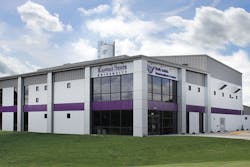Bulk solids research center sets out global ambition
Kansas State University has appointed the first research director at its new facility that focuses on the science and understanding of bulk solids materials handling.
The Kansas State University Bulk Solids Innovation Center, which opened in May, is located on the university’s Salina campus. It houses six laboratories for university and industry-sponsored research; training, conference and lecture rooms; a material properties test lab; and a full-scale bulk solids test bay.
As research director, John Lawrence will work to solve the movement challenges associated with bulk solids as they pass through the hoppers, or containers, in which they are stored. Particles can become densified and stagnant in various spots in the hopper, preventing all the material from flowing smoothly, the university said. Lawrence’s research will also focus on finding and solving problems within particle disintegration and segregation in the pipeline during pneumatic conveying.
Lawrence also manages the day-to-day activities of the facility and is developing beginner and advanced short courses in bulk solids for technicians and engineers in the industry.
“Coming from the private sector, John has a vast understanding of the needs and challenges faced by the bulk solids industry,” said Kurt Barnhart, associate dean of research at the Kansas State University Polytechnic Campus. “This extensive experience, combined with his academic preparation and research in agricultural and biological engineering, makes him well suited to lead this center for the university.”
Lawrence said that he wants the Bulk Solids Innovation Center to be seen as an international resource for education and research in the field.
“We want to make this a global institute,” he explained. “If a bulk solids company hires an engineer who has had no previous exposure to this type of particles handling, he or she will be able to come to our center and comprehensively learn about the process through our hands-on training. Kansas State Polytechnic also is discussing options of incorporating a few bulk solids classes into its engineering technology programs and developing a master’s degree in bulk solids that could be taught through the center.”
